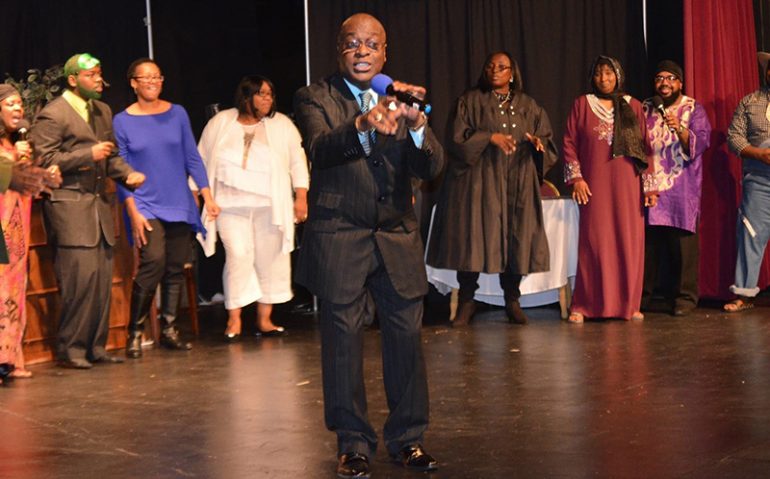Showbiz produces some interesting people. Mike Wilkins is certainly one of them.
“Dr. Mike,” or “Pastor Mike” as he’s called – Wilkins has two PhDs, which makes him a doctor, and one of which is in theology, which also makes him a pastor – is the impresario behind the SPAA Theater and Performing Arts Center in downtown Park Forest.
Though he has been writing, directing and producing live plays for over 18 years, Wilkins is in just the second year of ownership of his own theater, currently offering its third season of positive, community-oriented productions in this quaint southern suburb about 35 miles from downtown Chicago.
Wilkins and his SPAA Theater Actors Troupe put on about 10 shows a year in the facility that used to be home to the old Illinois Theater Center. Generally, half of the productions are musicals and the other half are original scripted stage plays, comedic and/or dramatic, like this week’s production of What Goes Around Comes Around, (originally titled Queer As You Want Me 2 Be).
Set in a beauty parlor, the play is about how people in relationships manipulate one other and take each other for granted. It runs this Saturday, August 27 at 2 p.m. and 7 p.m. and Sunday, August 28 at 4 p.m. Tickets are $25 in advance, $30 at the door, and dinner is available in the theater lobby separately for $12.
This Friday, August 26 at 7 p.m. is the theater’s monthly comedy and karaoke showcase OMG Funny, featuring local and national comedians for $15 at the door, with food and drinks extra.
Also on SPAA Theater’s schedule for the Fall season are:
September 10 – Me & Mr. B jazz legacy salute to Billy Eckstine and Duke Ellington by Laurence “Blinky” Walden at 2 p.m. and 6 p.m.
September 24 – I’m Still Here Purple Passion Plus Annual Charity Luncheon and Fashion Show to benefit victims of domestic abuse at 12 noon.
October 14-16 – The Legends of Soul salute to some of the best music and greatest soul artists of the 1950s through the 1970s.
November 11-13 – The Queens of Soul musical tribute to Aretha Franklin, Gladys Knight, Patti LaBelle and Natalie Cole.
December 10-11 – Tears of Salvation, a SPAA Christmas play and soul holiday celebration.
SPAA productions for the Spring 2017 season will include the adult musical Grown-er & Sexier in February; the drama The Rape of the Heart in March; a revival of A Raisin in the Sun; and musical tributes to Sam Cooke, Luther Vandross, Earth Wind & Fire; Blue Eyed Soul, the Three Blind Men of Soul, and the blues. In addition, there will be a spoken word open mic festival, as well as puppet shows.

Closer To Home
It’s all an effort by Wilkins and company to serve a vastly underserved economically influential African-American market south of Chicago.
“When you’re talking specifically about live theatrical programming geared to encouraging and promoting African Americans, they are far and few in between,” says Wilkins. “There’s not much on the South Side. eta (Creative Arts Foundation) and Jackie Taylor with BET (Black Ensemble Theater) up north are pretty much it.
“We always support Jackie Taylor and folks out here always travel to BET – we rent buses to go – but it’s also nice to have something closer to home.”
Closer is right, considering that eta is a 54-mile roundtrip drive from Park Forest and BET is 84 miles there and back, which makes for a long commute for a nice evening or afternoon out.
In the meantime, SPAA theater is splendidly located to serve the solidly Black middle class in the surrounding communities of Matteson, Chicago Heights, Country Club Hills, Flossmoor, Olympia Fields, Richton, Lansing, University Park and the like.
“We get them,” Wilkins says. “And there are groups that come in from Chicago to support us. We actually have people who take buses from Chicago to come out here for our shows.”
Unfortunately, Wilkins says that SPAA Theater is still one of those well-kept secrets. “That’s one of the challenges we’re dealing with,” he says. “People are starting to find us, but they’re like, ‘We didn’t know you were here!’ So half of our whole existence is letting folks know we’re out here. And those who find us support us. Generally, it seems, if they come for one show, they will come for others.”
Which brings up the second challenge for Wilkins and his troupe. “You have to have quality professional theater,” he says. “Our folks aren’t that forgiving, so you better be right or they will let you know. Just because you’re here doesn’t mean a lot; you still gotta bring it!”
SPAA Theater must be doing something right as far as “bringing it,” since it is in its third production season with absolutely no funding whatsoever.
“No grants, underwriting or anything,” Wilkins says. “Our ticket sales and the programs that we try to do are the funding that we get and however many dollars I can get out of my wife’s purse! That’s primarily it. It covers it, but barely. So we have to be really creative.
“But we’ve been blessed with a really good core group of about eight volunteers and more folks who come and go, including my wife who’s always there. We try to give little stipends for those who are always here helping, but there’s no one that we pay consistently to be here.”
However, Wilkins does have the theater operation on good footing, even though he’s seeking to reach his three primary goals of finding funding sources, increasing the marketing, and continuing to provide quality productions and programs.
He says, “When the community does discover that we’re here, they go, ‘Wow, we really got to see a quality production.’ We know how important that is – at $25 a show, $149 for a season ticket, with free parking and we’re right here in the community.
“The feedback from the community has been, ‘We didn’t know you were here but we want you to stay here.’ I’m like, well, just go tell all your friends because with their support, we’ll continue to be able to be here.”
Even without securing funding, SPAA can continue to survive, according to Wilkins. “We know we qualify for some funding and we want to get it, but we could also continue to make it like this,” Wilkins says.
“It just clearly doesn’t make sense to continue to do this if we could do better, so our position is getting in a place where we could do better, and I know we could be doing better without any outside funding if we could just get folks to know we’re here to come out and support the doggone theater.
“The numbers are clear, they rarely ever lie, and we know what the basic bottom line is. If we had just a couple productions a month with those shows being filled, that would be sufficient to make sure our lease and our utilities are taken care of, and to be able to give the stipends that we do for our actors and the help.”

The Road From Robert Taylor
This is where Mike Wilkins becomes an interesting man in terms of showbiz. He’s the creative force behind most of SPAA’s productions, but he knows all too well how to run a business. The former trait is his passion, the latter his vocation on an interesting journey.
Wilkins was born and raised in the Robert Taylor housing projects on 45th and State in a single-parent family of nine. Then his family moved to Roseland. “Looking back,” he muses, “statistically I should be dead or in prison. But I had an opportunity to do some things.”
The family moved to Park Forest in 1977, where Wilkins graduated from Rich Central High School. He took a semester at Prairie State Community College, “and I said, ‘college is not for me.’” He joined the army and took advantage of the Veterans Educational Assistance Program, which paid three dollars in to his one dollar, “and I said, ‘college would be a good thing right about now,’” Wilkins recalls.
Over eight years, the program paid for his bachelor’s in business administration, his master’s in accounting, and then had accumulated enough money when he got out to go to school for his two PhDs, one in accounting and the other in theology.
He opened an accounting firm in Louisville, where he had been stationed, and gave new CPA graduates space in his office to learn. He also joined an accounting association that needed someone to help train people.
“I really didn’t care a great deal about accounting, it was just easy to me,” Wilkins says. “So I pretty much know how to run an operation.”
In the military, he opened his first business, a dating service called Data Match that he sold to Matchmakers back in the 1980s.
“I was just doing the hookup thing,” he explains of starting the business. “I was single and goofing off, but I always had the business perspective on things.”
Wilkins also started doing plays and productions in Louisville, putting on stuff. I used to enjoy going to theater,” he says. “Dating, instead of going to dinner and a movie, I’d try to go to dinner and a play to impress the girls. A lot of times after seeing a show, I’d say, ‘Wow, that really wasn’t that good.’ But I always had the belief that if I couldn’t do better at something, I really shouldn’t talk about it.”

“I’d never make any money on the plays and would say, ‘I’m not going to do that any more,’ but as soon as that one got done, I’d start another one. It was really a passion.”
He eventually returned to Park Forest and opened an accounting firm, but kept his passion going. He did ministerial stuff in churches in South Holland and Ford Heights and founded the Created By Christ ministries, which did theatrical productions.
“But my position was that some folks aren’t ever going to step foot inside your church (to see a show), but you can do some positive stuff right in the community and they’ll pay and come see it,” says Wilkins.
So for about 15 years, Wilkins started doing different productions in the south suburbs, going from facility to facility, renting places – “Bloom Trail High School, any of the high schools, anybody with an auditorium as a matter of fact, for many, many years,” he says.
Wilkins considered buying the Regal Theater on 79th Street once it became available, and thanks the owners for honestly telling him how prohibitive the costs would be for that undertaking, so he dropped the idea. In the meantime, the Illinois Theater Center had been vacant for a while and the village of Park Forest leased it to Wilkins’ group in 2014.
Community Theater Arts Haven
Since then, he has endeavored to make SPAA Theater an arts haven. “I thank God for the blessing of this theater,” he says. “We’re trying to encourage folks to understand the importance of theater and the arts, especially for African Americans.”
The SPAA Theater and Performing Arts Center, Wilkins says, attempts to provide education plus entertainment and an opportunity for the community to participate in a full spectrum of the arts.
Anyone who feels that have any talent are encouraged to come audition at 6 p.m. on Wednesdays doing anything they want – singing, rapping, tap dancing, telling jokes, doing flips, playing instruments.
“Then for our productions, whenever we have a need for any of those talents, we bring those people in. We try to write them in, say if somebody can juggle,” explains Wilkins, who says he would love to get his hands on a Black ventriloquist. “And if nothing else, we just let them open up for one of our regular shows so they can get the exposure, so people can see them and give them an opportunity.
“Last year we had these three kids – ages 20, 16, 14 – and they played the blues better than some guys I know who are my age. We got them in to open up a show for us. We do that often if we don’t have roles for them in the productions.”
SPAA offers theater, acting and film boot camps – usually a week long – for those who want to learn the intricacies of those fields. It also offers intensive training to certify paid professional motivational speakers, life coaches and authors and helps aspiring writers self-publish books. Wilkins himself has published 17 of his own books and written over 30 plays.
One of SPAA’s most popular activities is Crime Scene Investigation Camp, where participants learn to investigate and solve crimes just like on the TV show. Wilkins was a criminal investigator in the army and integrates fingerprinting, camera usage, interrogation techniques, sketching and terminology into scenarios that begin with a crime and end up before a mock jury to see if the camp participants nail the right suspect.
“We want to do whatever we can to help introduce folks to the arts and to provide outlets for those involved in the arts.”
“For kids, the scenario might be finding a lost dog or someone bullying or someone stealing something, but for adults, somebody’s gotta get killed,” Wilkins says.
The average class size for the camps is between 15-20 people, and participants range in age from six years to seniors. SPAA hopes to add stepping and line dancing classes shortly.
“The more we get folks in here and they get familiar with the activities going on here, the better it will be in the long run,” Wilkins says. “We want to do whatever we can to help introduce folks to the arts and to provide outlets for those involved in the arts. This theater is 10,540 square-feet and we try to use every single inch of this facility to do something good in the hood.”
SPAA Theater and Performing Arts Center is located at 371 Artists Walk in downtown Park Forest, around the corner from Village Hall. For info, call 708/748-9470 or visit www.spaatheater.org.






